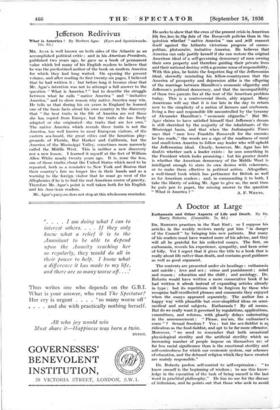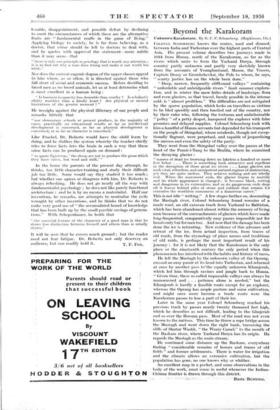Euthanasia and Other Aspects of Life and Death. By DT. •
A Doctor at Large
Harry. Roberts. (Constable. 7s. 13d.;) . - Da. ROBERTS practises in the East End ; so I suppose his articles in the: weekly, reviews rarely put him " in danger of the Council." by bringing him new patients. But many of his readers must, have wanted more of his advice, and they will all be grateful for his collected essays. The first, on euthanasia, reveals his experience, sympathy, and keen sense of folly. Yet I regret that it gives the title to a book that is really about life rather than death, and contains good guidance as well as good argument.
The contents are presented under six headings : euthanasia and suicide ; love and sex ; crime and punishment ; mind and reason ; education and the child ; and sociology. Dr. Roberts would have written a more consecutive bOok if he had written it afresh instead of expanding articles already in type ; but its repetitions will be forgiven by those who recognise half-recollected phrases and comments they enjoyed when the essays appeared separately: The author has a happy' way with plausible but over-simplified ideas on semi- medical and social subjects. Euthanasia ? By all means. But do we really want it governed by regulations, applications, committees, and referees, with ghastly delays culminating in the announcement : " Please, ma'am, the euthaniser's come " ? Sexual freedom ? Yes ; but the sex-faddist is as ridiculous as the food-faddist, and apt to be far more offensive. Moreover, " we need to remember that both occasional physiological sterility and the artificial sterility • which an increasing number of people impose on themselves am of far less racial significance than is the emotional sterility and self-centredness for which our economic system, our schemes of education, and the debased religion which they have created arc mainly responsible."
Dr. Roberts prefers self-control to self-expression " to
know oneself is the beginning of wisdom ; to use this know- ledge -in the erfecntion of the task of being oneself is the last -ivord in practibal philOsophy." He hai no use for the disease of indecision, and he points out that those who seek to avoid
trouble, disappointment, and possible defeat by declining to meet the circumstances of_whieb these_ are the .alternative fruits are --" fundamental Muffs in the game of living." Applying biology to society, he is far from believing, . as a doctor, that crime should be left to doctors to deal- with, and he quotes with approval the statement—more Oubtle than it may seem—that
" there is only one principle in penology that is worth any attention ; it is to find out why a man does wrong and make it not worth his while."
Nor does the current eugenic dogma of the upper classes appeal to him where, as so often, it is directed against those who fall short of social and economic success. Before deciding to breed men as we breed animals, let us at least determine what is most excellent in a human being :
." Is business incapacity less desirable than cruelty ? Is scholastic ability worthier than a kindly heart t Are physical or mental limitations of the greater moment ? "
He inveighs against the physical illiteracy of our people and remarks bitterly that
" our elementary schools at present produce, in the majority of eases, practically no educational results so far as intellectual development is concerned, so far as physical development is concerned, or so far as character is concerned."
Like Frocbel, Dr. Roberts would have the child learn by doing, and he dislikes the system whereby the teacher chiefly tries to force facts into the brain in such a way that these same facts can be produced again on demand :
" to quote Epictetus, ' the sheep are not to produce the grass which they have eaten, but wool and milk.' "
In the home the parents of the present day attempt, he thinks, too- little character-training and study their difficult job too little. Some would say they studied it too much ; but whether one agrees or disagrees with him, Dr. Roberts is always refreshing. He does not go nearly all the way with
fundamentalist psychology.;. he does not like purely functional architecture : and he is by no means a materialist. Half our
inventions, he remarks, are attempts to neutralise the evils wrought by other inventions, and he thinks that we do not make very good use of " the accumulated hoard of knoWledge that has been built up by the small psychic savings of genera- tions." With Schopenhauer, he holds that
".the essential feature of the character of a good man is that he draws less distinction between himself and others than is usually drawn."
It will be seen that he covers much ground ; but the reader need not fear fatigue. Dr. Roberts not only deserves an
audience, but can readily hold it. T. F. Fox.











































 Previous page
Previous page